
How To Find Inherited
Homeowners And List Them
Inherited Homes are a vast, overlooked source of listings. Over 1.1 Million Homes are inherited each year, and many of them are listed shortly thereafter. In this course, I’ll show you how to get these listings.
Step 1: Find the Inherited Homes in your area. In the first part of this training, I’ll show you how to find the Inherited Leads in your area.
Step 2: Find the Personal Representative or Executor of the Estate so you can reach out to them.
Step 3: Find the Mailing Address and Phone Number of the Personal Representative.
Step 4: Send them your book with a Cover Letter. We’ve found this is the best way to approach the Personal Representative.
Step 5: Follow up on your leads — until you reach them. Most listings are won when you follow up on a lead. Yes, the book “paves the way” and turns a “cold” call into a “warm” call. But, you must follow up if you’re serious about winning listings.
Step 6: Winning the Listing. We’ve got a bunch of tips on listing presentations, building rapport, and other strategies for winning the listing.
Step 7. Working with the different parties involved on an Inherited Home Listing. An Inherited Home can be a very emotionally charged listing. We have some great tips on how to work with everyone and making the process move along smoothly.
Other Ways To Find Inherited Leads Sometimes, you may not be able to access the Court Records in your area. In that case, you can find the Inherited Homes using Obituaries or local Property Records.
Bonus Training: How to Hire an Inexpensive Virtual Assistant to do the research for you.
Ready to get started? Then scroll down to Step 1 below, open it up, and get started.
The best way to find the Inherited Homes is using the Probate Court Records. Below is a video that shows how to do that.
Overview:
A. Find the Probate Court Cases on your local courthouse’s website.
B. Once you find a lead, you want to qualify it. To do this, verify that the person who passed away owned real estate AND that they are the last remaining spouse.
Nitty Gritty Details:
OK, so now that you understand the big picture, let’s dive into the nitty gritty details.
A. First, you’ll want to find the Probate Court Cases on your local courthouse’s website. Most Court Cases are filed with your local Courthouse. You can usually find the information with a Google Search.
Try searching “CountyName County StateName Probate Case Search.”
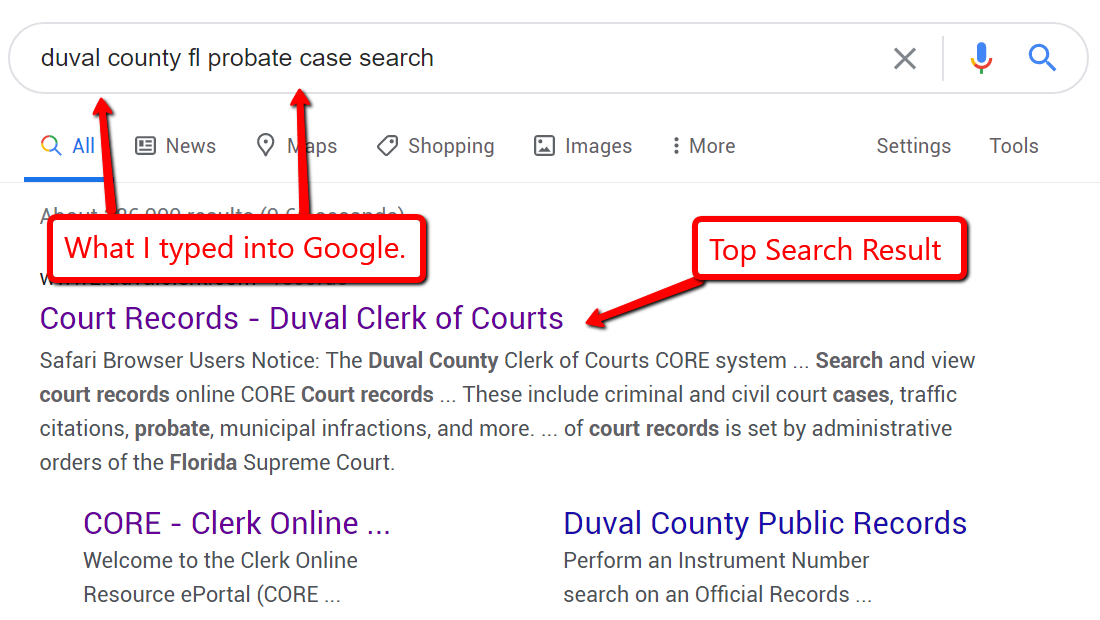
Once you find the site, try and find the records on it. Some of these sites are a little bit hard to use, and there is a good chance you will need to call their office for help.
It will take some persistence, but once you figure it out, you’ll be able to find the court cases. If you are not able to find the information on the website, contact the courthouse and have someone help you.
I recommend calling several times until you find a clerk that will help you. When I was new to the business, some clerks told me that I couldn’t access certain courthouse records. I didn’t believe them, called back, talked to another clerk, and they helped me find the information.
Anyways… I managed to find the Probate Court Cases in Duval County


About 4,450 were filed in 2019.
B. Once you find a lead, you’ll want to do the following to qualify that lead:
I checked the top probate case and found that the owner did own real estate, and it doesn’t appear she has a spouse on the title.


This lead looks promising! So, let’s continue on to Step #2 and I’ll show you how to find the decision maker and their contact information.
If you absolutely cannot find the Probate Court Records in your area, there are other options for you. I lay out several of them in the last module of this training.
You want to find the decision maker who has the authority to sell the house. Usually that’s a Personal Representative, the Executor of the Estate, or an heir.
There are several different ways to do that:
Let’s go through these options one at a time.
How to find the Best Contact Person - using the information in the Probate Court Case Records.
I’ll use this estate as an example. I found the Probate Case using the instructions in Step #1 above.

I clicked and opened the case and found the following information.
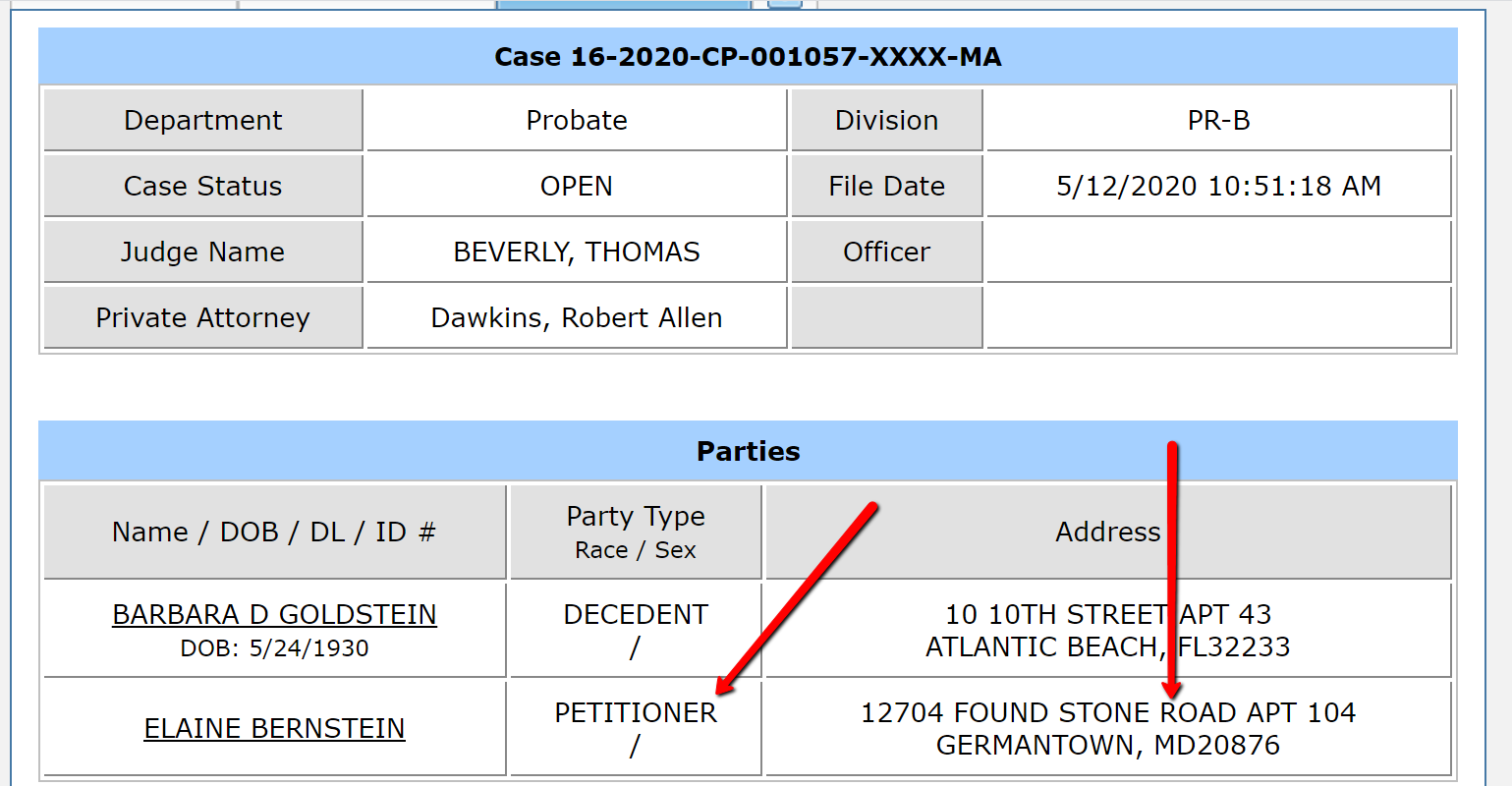
Usually, the Petitioner is the Personal Representative, but I was able to confirm that on this case because I went through the court filings.
I found a Petition for Summary Administration on the Court Docket.

I was able to access the document and found this paragraph on it:
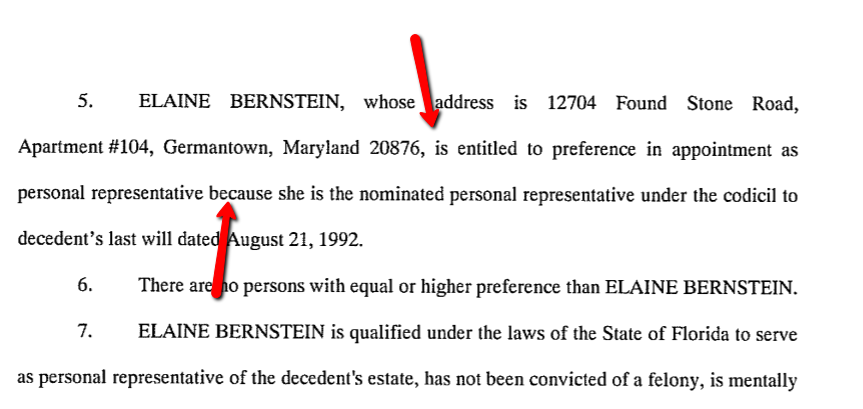
So now that I know I have the right person, how do I find their contact information? I’ll show you how in Step #3.
How to find the Best Contact Person — using the information from the Obituary.
I’ll use this property as an example.

I searched Google and found her obituary. See below.
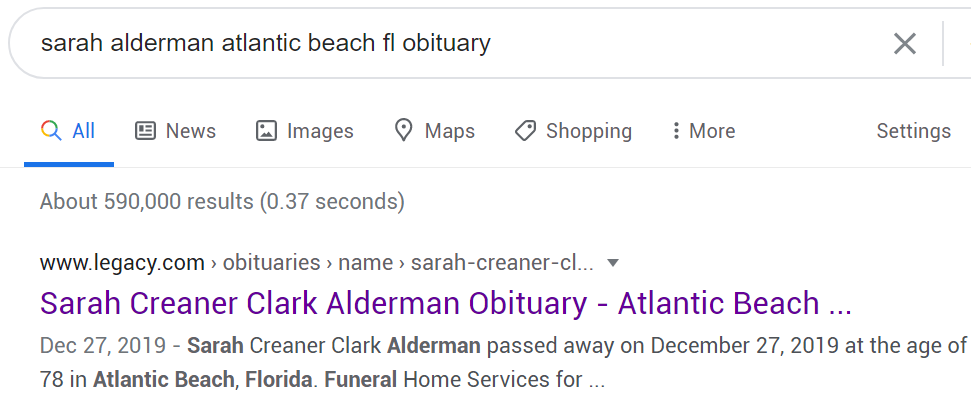
In the obituary, you’ll want to look for the part that says “survived by” or something like that. Here’s that part of Sarah’s Obituary.
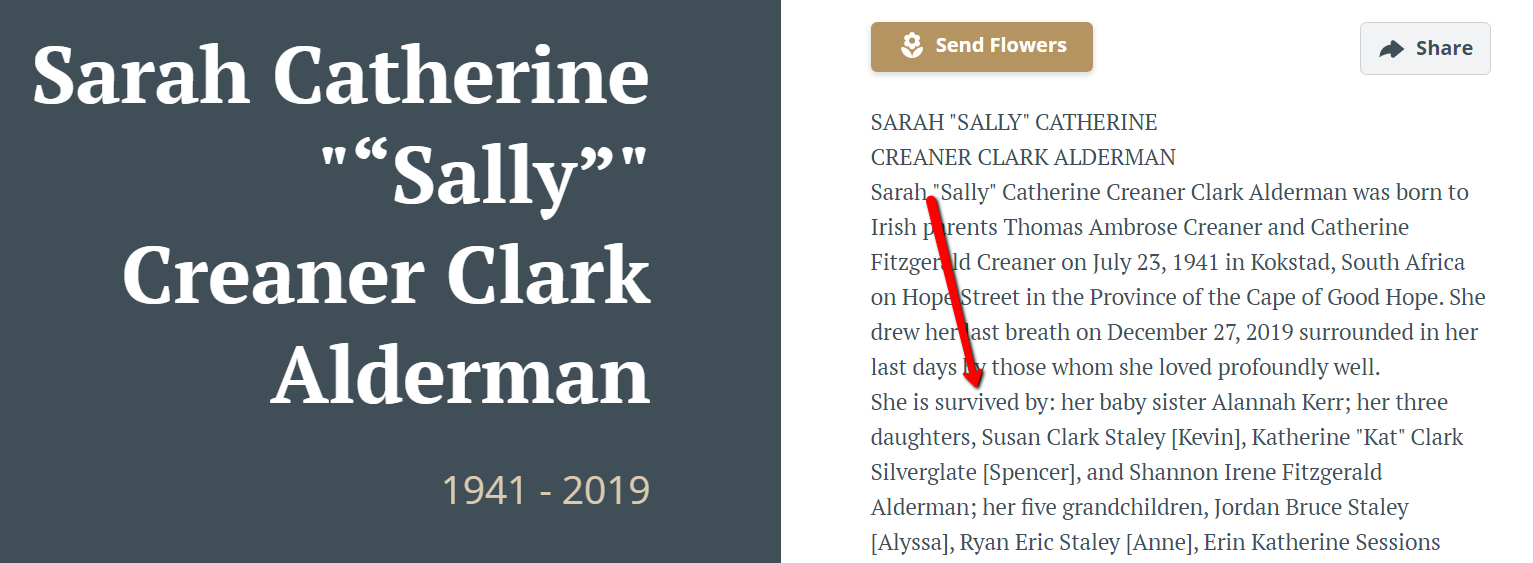
Now that I have their names, I need to find them. You have to be a detective and dig up the information!
First, try to see if their heirs live in the area. You can search local property records or the White Pages or simply google their name and the city. For example, “Susan Staley Jacksonville, FL.”
I found a “Susan Staley” in Orange Park, which is about 40 minutes away, but I couldn’t find any tangible information on her, such as property records, address, or even a phone number.
So I searched for the next daughter and found her. See below.
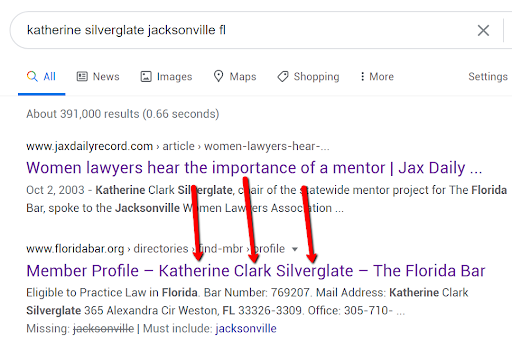
Notice that she matches all 3 names in the Obituary below?
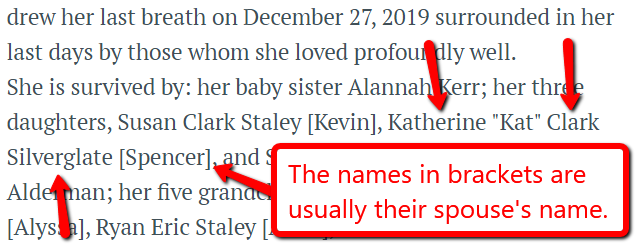
And when I searched for “Katherine and Spencer Silverglate,” this is what I found:
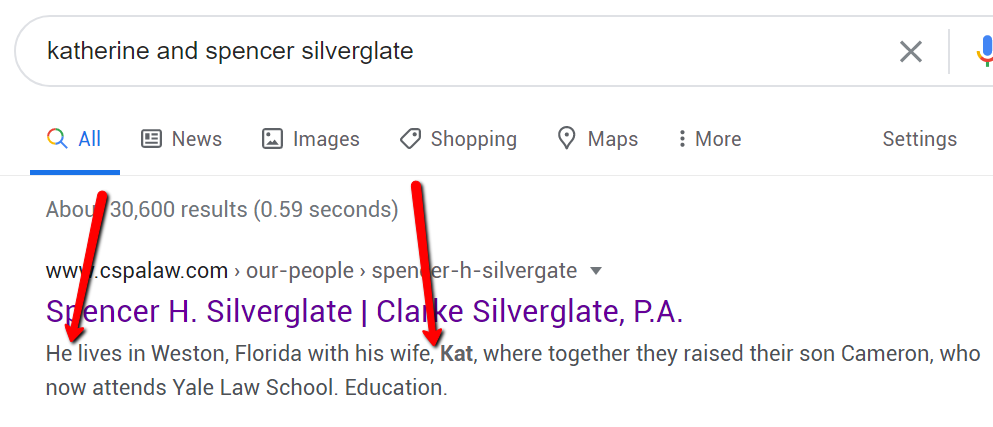
So now that I know I have the right person, how do I find their contact information? I’ll show you how in Step #3. If you’re ready, go there now.
If you can’t find the person using one of those methods, mail your book to the deceased at their address. One of the heirs is bound to stop by and check the mail.
If you only want to mail the best leads, then drive past the homes and see if anyone is living in them. If a home looks empty, then it’s worth sending them your book.
I found 2 Inherited Homes about a mile away from our office, so I drove past them this afternoon. One of them was clearly occupied.
But the other had those telltale signs of being prepped to go on the market. Look at the picture below.
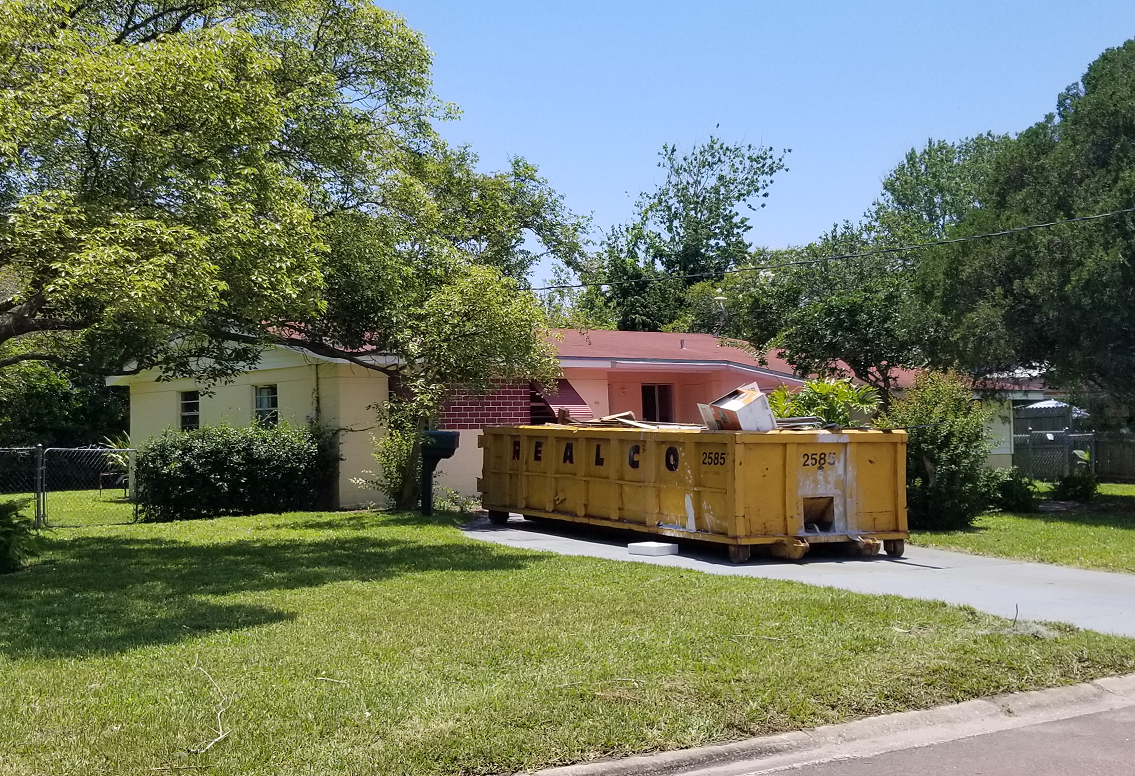
I would definitely send them my book and maybe even leave a note on the door!
Once you find the Personal Representative or Executor, you’ll want to find their mailing address and phone numbers.
4 Ways to find their mailing address:
You can usually get their mailing address from the Probate Court Case. That is the first place I’d look.

How to find their mailing address using Local Property Records. I was looking for Paul Stanford, who inherited a home in Atlantic Beach, FL. I found his address in the local property records. See below.

How to find their mailing address using WhitePages.com. See an example below.
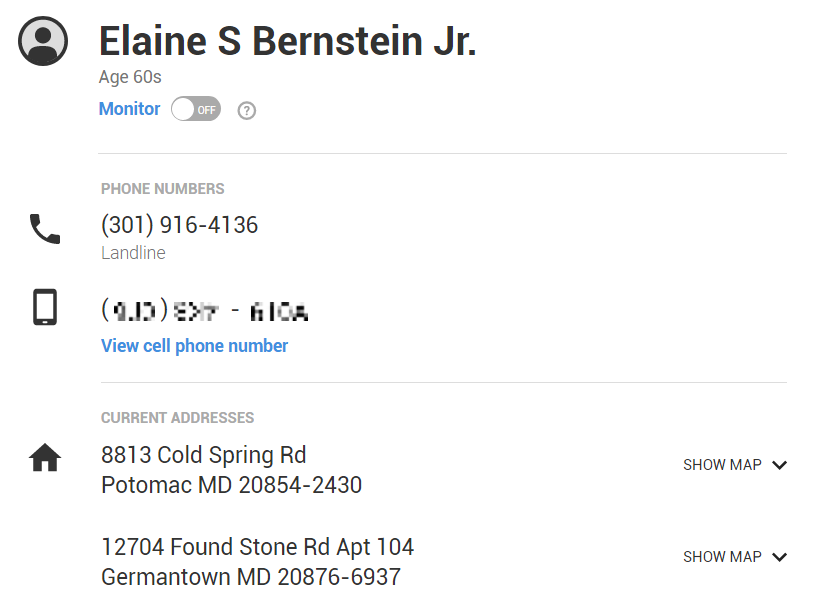
How to find their mailing address using Google. That’s how I found the mailing address for Katherine Silverglate, who inherited a home in Atlantic Beach, FL. I Googled her, discovered she is an attorney, and found her address on her Florida Bar Member Profile. See below.

3 Ways to Find Their Phone Numbers:
How to find their phone number using WhitePages.com. See an example below.
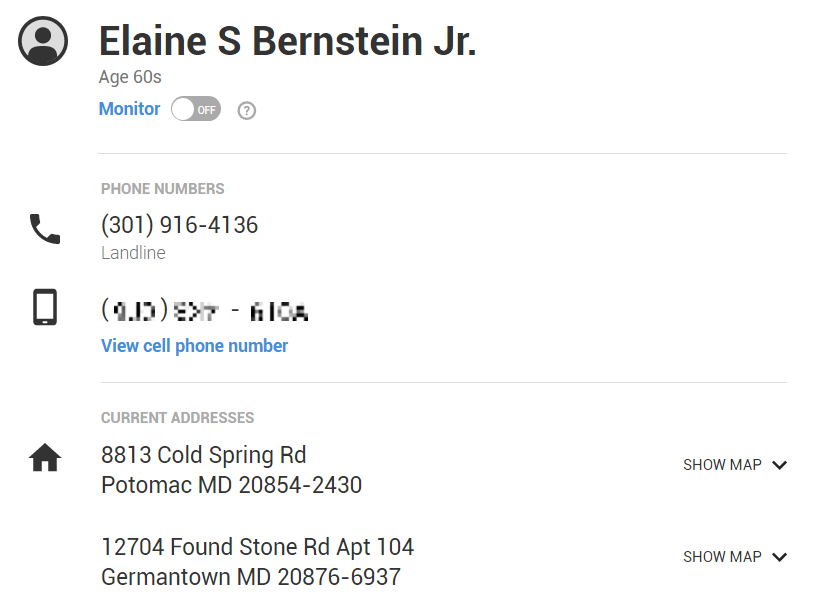
Unfortunately, their cell phone number is blurred out, and the only way to access it there is by signing up for their paid service. This is why I don’t like White Pages! If you’re serious about getting listings, sign up for a phone number service like Intelius Premier.
How to find their phone numbers using Intelius Premier. Intelius Premier is the best source because they provide cell phone numbers and don’t try to sell you unnecessary reports. It costs $20 a month, but you’ll save a lot of time using their service.
Here are the Intelius Premier Results for Paul Stanford.

Notice how many more phone numbers I have! Yes, some of them are junk, but if I call all of them, I will probably reach him.
How to find their phone number using Google. Just search the person’s name, along with the City and State. You can find other records and information that may yield a great phone number.
Here is another record I found on Google for Paul Stanford.
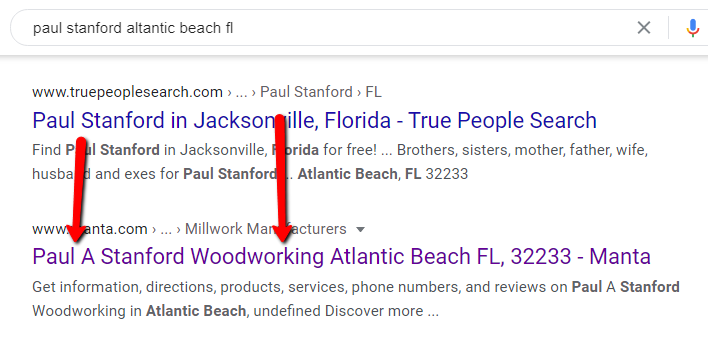
Here is a business record and phone number for Paul Stanford.
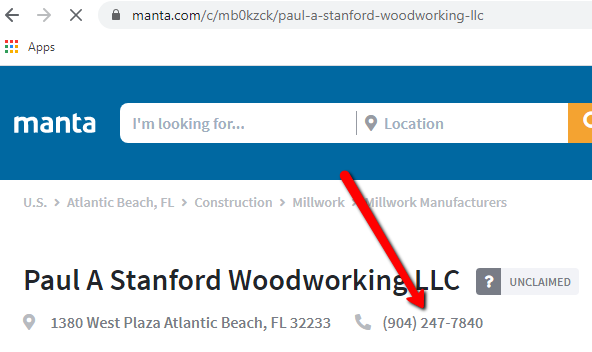
I wouldn’t have found that if I didn’t look him up on Google.
Once you get the information, you’ll want to organize your leads by adding them to your CRM or organizing them in a Google Sheet. If you use a CRM, add them in, or you can add them to a simple Google Sheet like you see below:
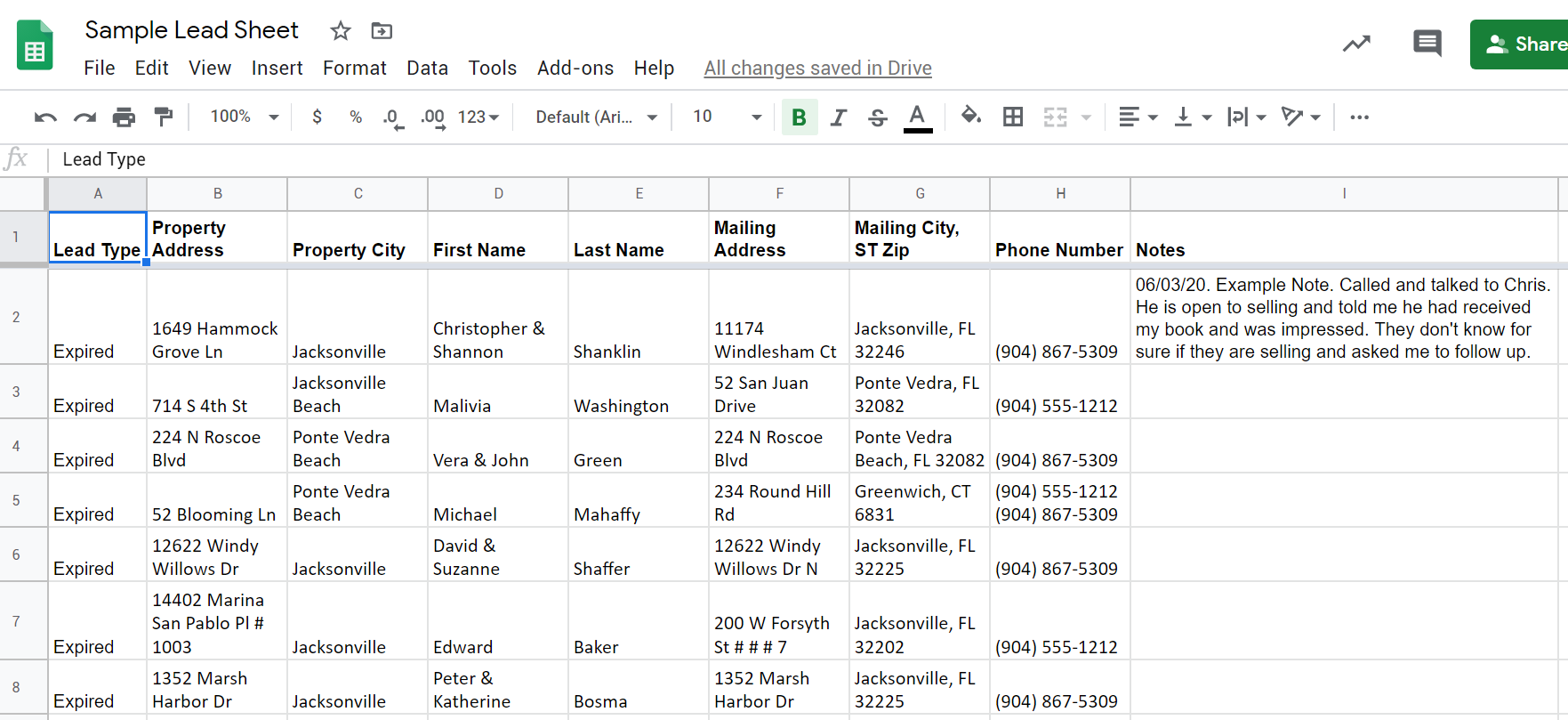
We have found that when you send out your book first, it turns a“cold call” into a “warm call” — so when you follow up a week or two later, the leads are friendly and receptive.
How to mail your book.
Insert your book and the package contents inside a bubble mailer. Once you’ve got your books packed up, go to the post office, buy stamps and mail them to your leads.

Here’s an example of the book being put into a bubble mailer.
Where to buy the bubble mailers:
Alternatively, you could insert your book into a clear bag, fold the cover letter over, insert it inside the pages, and leave that at the front door.
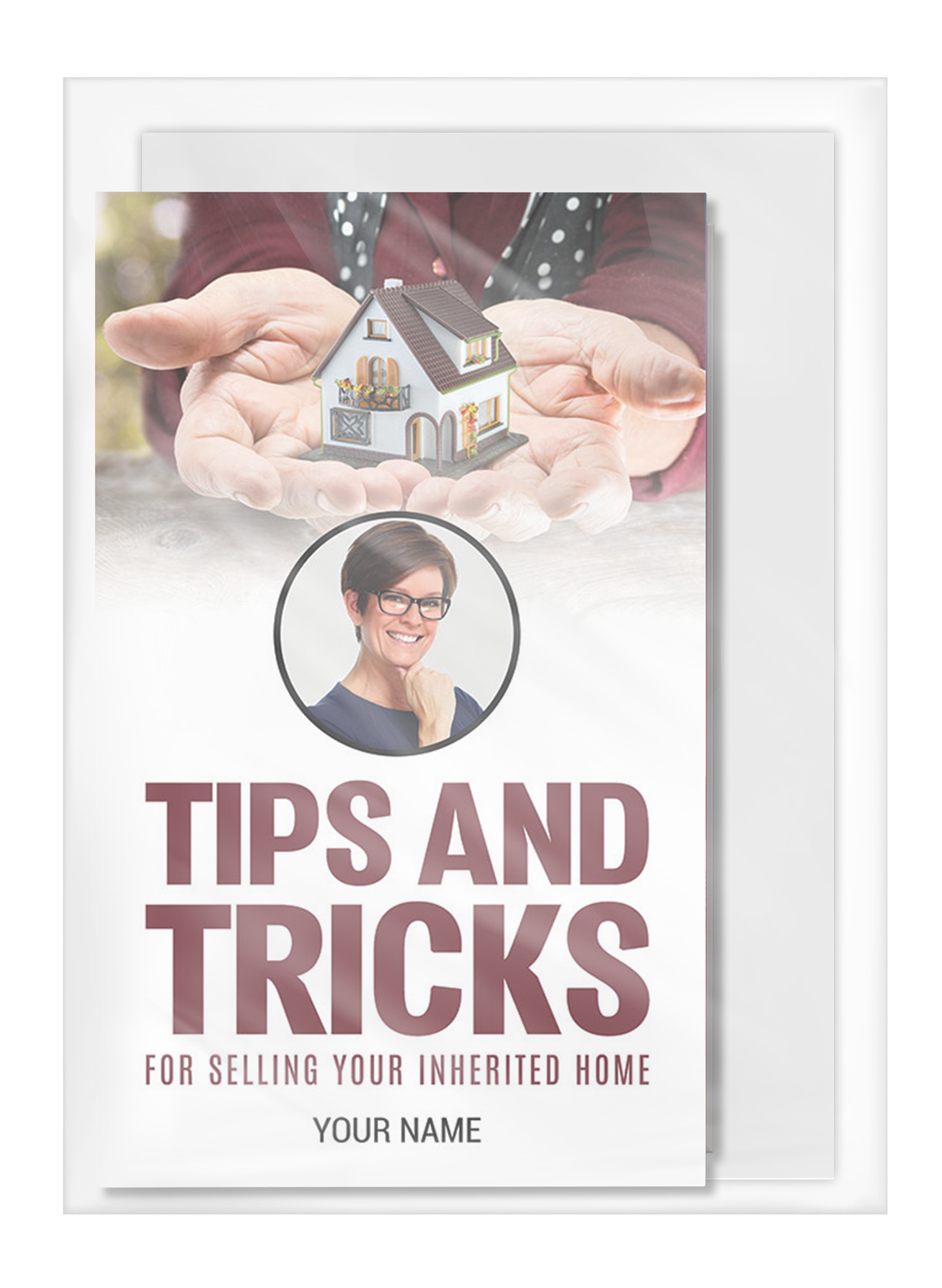
What to include with your book. We recommend including a Cover Letter that introduces yourself and explains how you can help. Below are a few Cover Letters you can use.
Follow up on your leads about a week after you mail them your package. Here’s a script you can use to follow up, start a conversation, and get listings.
If they are on the Do-Not-Call List, knock on their door and talk to them. You can use the script to start the conversation.
It pays to be persistent and continue following up repeatedly until you reach them.
In our experience, about 60% of all listings are obtained after multiple calls. One time, we listed a home after calling a seller just about every day for 2 weeks. It took 10 phone calls, but the $8,750 commission was worth the extra calls!
Most of the people you call will be friendly, but a few will be unhappy that you’re calling them. If they complain, simply apologize and end the phone call.
Consider adding direct mail to your follow-up efforts.
If you can’t reach the Personal Representative after five calls, mail them the first letter below, wait a week, and call them again. Repeat this process until you’ve sent the four follow-up letters and followed up four more times over the phone.
Inherited-Follow-Up-Letter-1-Marketing
Inherited-Follow-Up-Letter-2-Formula
Your main goal is to meet with the main decision maker — which is usually the Personal Representative or Executor of the Estate. But sometimes, you’ll find a lead where one hasn’t yet been assigned.
In that case, you’ll be meeting with one of the heirs. You should strive to build rapport and put yourself in first position as the agent to hire if all of the heirs agree to sell.
If possible, try and meet all the heirs at the same time. If you don’t, you’ll need to meet with each one, do a CMA, give them your listing presentation, and try to win them over.
If you succeed using this method, you can win over enough of the heirs to gain consensus and win the listing.
10 Tips For Winning More Of Your Listing Presentations:
#1. Use our books to show how you’ll sell their home for top dollar because your marketing will attract more buyers and generate more interest in the property.
Our books talk extensively about the best strategies for marketing a home. So, familiarize yourself with your book and talk about the contents.
#2. Use our Easy Close Listing Presentation and support materials. This presentation supplements the books and talks about 5 different strategies you will use to get the seller top dollar. We’ve tested it on dozens of listing appointments.
You can access it on this page. Just look for the Easy-Close Listing Presentation.
#3. Show how you can make the Personal Representative’s job easier. Many of the sellers are out of town. Oftentimes, little things will have to be done to prepare the home to go on the market.
If you offer to help oversee those things, that will take a load off their shoulders and win you the listing. I once won a listing for a seller who lived 1,000 miles away because I offered to find someone to clean the home and pool.
#4. Use the assumptive close. This is where you just assume the person is going to list with you, and the paperwork, etc., is just a formality. You’d be amazed how powerful this closing strategy can be.
I remember the first time I used it. The seller just listed with me and I was sitting there thinking to myself, “Look, they’re signing the listing agreement. I can’t believe this is happening.”
#5. Demonstrate that you can sell their house. Show the seller other homes you have sold and write up case studies on them. We have a sample of our Case Studies below. You’ll have to modify the document for your own business
If you don’t have case studies yet, then use your brokerage’s case studies. After all, when you’re just starting out, you’re going to need your broker’s help and credibility to get business.
#6. Learn everything you can about how to build rapport with people. One of the best books ever written on this subject is the classic book, How To Win Friends and Influence People. I’ve used the strategies inside this book and won more listings as a result.
#7. Sell yourself on how great you are at selling homes. Yes, I know this sounds arrogant and almost like magical “voodoo.” But, it works. Here are the best ways to sell yourself on the value that you provide.
Go through all of your successful case studies. Look at the homes you sold that other agents couldn’t sell. Look at the homes you sold for a record high price. When you reflect on your successes, you’ll realize the value you bring to the table.
Stop the negative self talk and focus on positive self talk. Tell yourself, “I’m the best Realtor in my town,” “I sell homes for top dollar,” “Sellers want to hire me,” etc. You might as well build yourself up, rather than beat yourself down.#8. Work hard to “up your game” and genuinely provide more value than your competition. Great marketing and sales will not make up for a low-quality product. In fact, they will only accelerate the speed at which people realize the product is low quality.
You need to constantly be on the lookout for new ways to market and sell your listings. Learn advanced negotiating strategies so you can do a better job for your customers.
Look for new marketing strategies to market your listings. Our books and listing presentation have some great marketing strategies, so start by familiarizing yourself with them and then look for other cutting-edge strategies.
#9. Learn everything you can about presentations, persuasion, sales, marketing, etc. Real estate is a marketing and sales business. There’s no way around that.
So, you might as well get really good at it. Study other agents’ listing presentations. Study the greats. Learn everything you can about the subject! Pretty soon you’ll start winning more listings, and the business will become fun again!
#10. Learn how to handle listing objections. The #1 way to handle objections is to reduce the odds of them coming up in the first place. Despite what you may think, most amazing salespeople are not much better than you at handling tough objections from difficult customers.
They just have more sales opportunities, are more convinced of why people should buy from them, and have more practice at handling objections.
I’ve met lots of amazing salespeople, and very few of them can work “miracles” and close impossible sales. Stop beating yourself up and use these tips to reduce the odds of objections ever coming up in the first place.
We’ll be releasing a blog post soon about the most common listing objections and how to overcome them. Be on the lookout for it soon.
We’ll be releasing a blog post soon about the most common listing objections and how to overcome them. Be on the lookout for it soon.
Tips for working with the different heirs on an Inherited Home
If you’ve ever worked with inherited home sales, you know how emotionally charged the process can be. Not only has the person selling recently lost a loved one, but there are often multiple players involved — some of whom don’t agree on what should be done with the home.
Over the last few weeks, we’ve talked with Authorify members who have worked in the inherited homes niche. We gathered their advice on dealing with highly emotional clients and ensuring the sale goes smoothly from start to finish.
Working with Emotional Clients
“It's just such a unique experience whenever you're working with them because it's one of those bittersweet things you’ve got to walk through,” says Marie Surratt, an agent from Tampa. “You listen to them talk about all the times that they had in that house and everything. So it's kind of like being empathetic and being there to support them and try to celebrate the life that they had and just kind of walk through and listen to them. And if you listen and relate — that's actually how I got one of the listings is because they're like, ‘Oh, you're the only one that is actually letting us talk about everything that's happened.’ And I think that's important for them to be able to get that closure.”
Marie says helping people through an inherited home sale is a form of healing, and she doesn’t take that responsibility lightly.
“I'm looking at it as like maybe taking one of those issues off so that a family can come back together, you know, because when you have the divide and trying to figure out what to do with this house and how to do this, and ‘Oh, well, why did mom say that they get to be in charge? And, you know, you have all those different emotions that — I just find that very rewarding as part of my job.”
Tiffany Hudson, an agent from Pembroke Pines, Florida, says securing inherited listings takes a modified approach.
“You know, as agents, we love to talk, and we have, you know, our script in our heads and everything else. But it's about being quiet and listening to the client's needs and coming from contribution. And if we put that in our mind first and foremost, all the time, then we'll always have happy clients.”
Home Pricing
Marie says one of the most challenging parts of listing an inherited home is attempting to take the emotion out of price setting.
“I would tell them, ‘Yeah, it's priceless,” ... but what you're trying to put a price on are your memories that you've had here. And you have those memories to take with you — like that's the one thing no one can take away. Realistically, if a tornado came through, if we had a hurricane and this house was wiped out, what would you have to spend to put it back? And that's what you're looking at when you want to talk about the value. And I also tell them to look at it — you know, the market value is only what somebody is willing to pay for it.”
David Olson, an agent from Cold Springs, Minnesota, says it’s important to approach pricing objections with solid facts.
“I just show them the data for what the type of the property has and how that's sold. So if they grew up in the house in the 70s or 80s, and they have certain memories there, I still have to show them properties that were built in the 70s and 80s and what they're selling for.
“So the value is the dollar of the house and not their intrinsic value that the family members might have. ...That's just the way it works. And they just have to start understanding that, but it might take a week or two for them to come to that realization.”
Preparing the Home for Sale
One of the hurdles Tiffany frequently has to overcome is getting clients to separate emotions from the home so they can properly prepare it for sale.
“What I normally do is I will say to them, envision a buyer coming into this house — you know, buyers buy on emotion. So we really want to neutralize the space so that they can envision themselves and their family in here. We want to put away personal items, photographs, memorabilia, and I always say to them, it's a good idea to start packing them now. And I’ll walk the house with them. I normally do like a free staging consultation. Sometimes, it's good to have a neutral party come in if you don't feel comfortable with having that conversation yourself. Because it definitely helps to get the seller on board and help them to understand the process of neutralizing and making it less personal because especially with older sellers and people that are dealing with grief, you know, everything is personal to them. And that space that does hold so much memories.”
Marie explains to her clients that any updates and adjustments they are willing to make to the home will impact the amount of money they receive for it.
“If you want this for your house, then you need to do X, Y, and Z. If you just want to paint and do a few things, you can get this for the house. If you want to sell it just as it sits and do nothing, this is what we're going to get. So you have a range to choose from. And then I let them talk about it, to decide. Top houses are immaculate. Like you're going to have to paint, maybe update the flooring, update the countertops and put, you know, five or $10,000 into it to get this price. If you look around and you go, well, you know, the baseboards need painting, the walls, need painting, and just really give it all a good cleaning, scrub the windows and everything. You're going to spend maybe $1,000/$2,000. We can price it right here.
Managing Multiple Players
As we previously mentioned, there are often multiple parties involved in an inherited home sale. It’s important to understand each of their roles and appeal to them.
“I would say, just really be prepared to be a great listener, to be able to hear the emotions and hear what they're actually saying and how they're feeling so you can make the connection and help them start,” Marie says. “For the most part, you might have one or two of them that are just looking at a number sense, like let's get rid of this house and let's just move on.
Especially if you have one family member that was there taking care of someone or that was there all the time and someone that lives out of state.
“So you have to be able to put different hats on whenever you're there.
Especially if you have one family member that was there taking care of someone or that was there all the time and someone that lives out of state.
“So you have to be able to put different hats on whenever you're there.
Listening will help you figure out how to deal with each person. And I mean, and they're not all good. Not all family members get along. So, you know, it's trying to bridge that gap and trying to get them to all come to an agreement because when you can't get them all to come to an agreement, you know, there's no deal. Because it's all or none, not a majority rules.
Ed Hru, an agent who specializes in divorce and probate listings, understands the dynamic of an inherited sale because he went through one himself.
“I know that when my parents died, there was friction between the three sons. One of them didn't like the fact that another one was the personal representative and made choices. He didn't like those choices. So even with our own family, we had disagreements on everything. You have people that don't need the money and you have people that really need the money. So there might be a difference between somebody who really wants to sell and somebody who says, no, let's wait until the market gets a little better.”
Other Ways to find Inherited Homes.
Option #1: Buy the leads from a paid lead provider.
Search Google for Inherited Lead Providers in your area. For example, search “County Name ST Probate Leads.” I did that and discovered that you can get probate court case filings from the local Legal Newspaper.
We found a few companies that will provide you with probate leads. We have no experience using them, but you may want to try them out. Those companies are Probate Leads (https://probateleads.com/) and US Probate Leads (https://usprobateleads.com/.)
Once you find the Inherited Home, the next step is to find the decision maker so you can contact them. I show you how to do that in Step #2 above.
Option #2. Find Inherited Homes by searching for the word “Estate” in your local property records.
You’ll want to search the property records in your area. Most counties have that information available online on the Property Appraiser or Tax Assessor’s website. If that isn’t available, you may be able to get the information from your MLS or a company like Property Shark.
Once you get access to the database, search for the word “Estate” in the Owner Name Field. This will usually return Inherited Homes that are owned by an estate.
You’ll want to weed out properties that have “Life Estate,” “Real Estate,” “Estates,” or any other lead that doesn’t look correct.
Below is an example using the Duval County, Florida Property Appraiser’s Website. I found 173 properties like this in Atlantic Beach, Florida — which is a high-end area near our office. I highlighted several properties that look promising.

You’ll want to weed out properties that have “Life Estate,” “Real Estate,” “Estates,” or any other lead that doesn’t look correct.
Below is an example using the Duval County, Florida Property Appraiser’s Website. I found 173 properties like this in Atlantic Beach, Florida — which is a high-end area near our office. I highlighted several properties that look promising.
There were a total of 30 promising leads in Atlantic Beach, which has a population of about 14,000 people.
One of these homes is already Pending. See below.
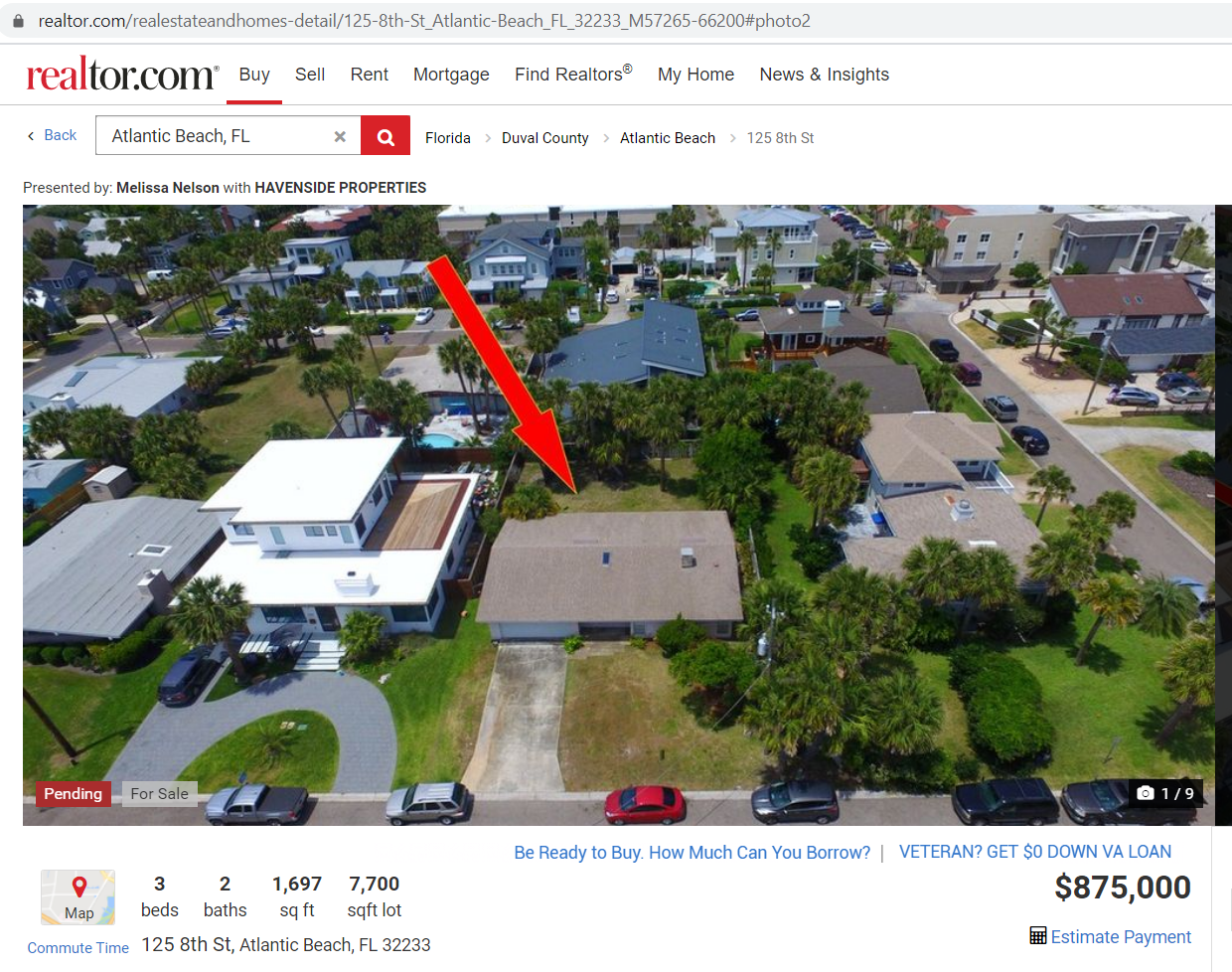
Here is the Property Appraiser’s Page for that home.


Now that you know how to do this, go and try it out using your local property records.
Once you find the Inherited Home, the next step is to find the decision maker so you can contact them. I show you how to do that in Step #2 above.
Option #3. Find Inherited Homes using Obituaries.
You can find Obituaries in your local newspaper, or on websites like Legacy.com, Tributes.com, or Funeral.com. Legacy.com is the biggest, so I’ll show you an example from there.
I found a list of recent obituaries in Atlantic Beach, FL, on their site.
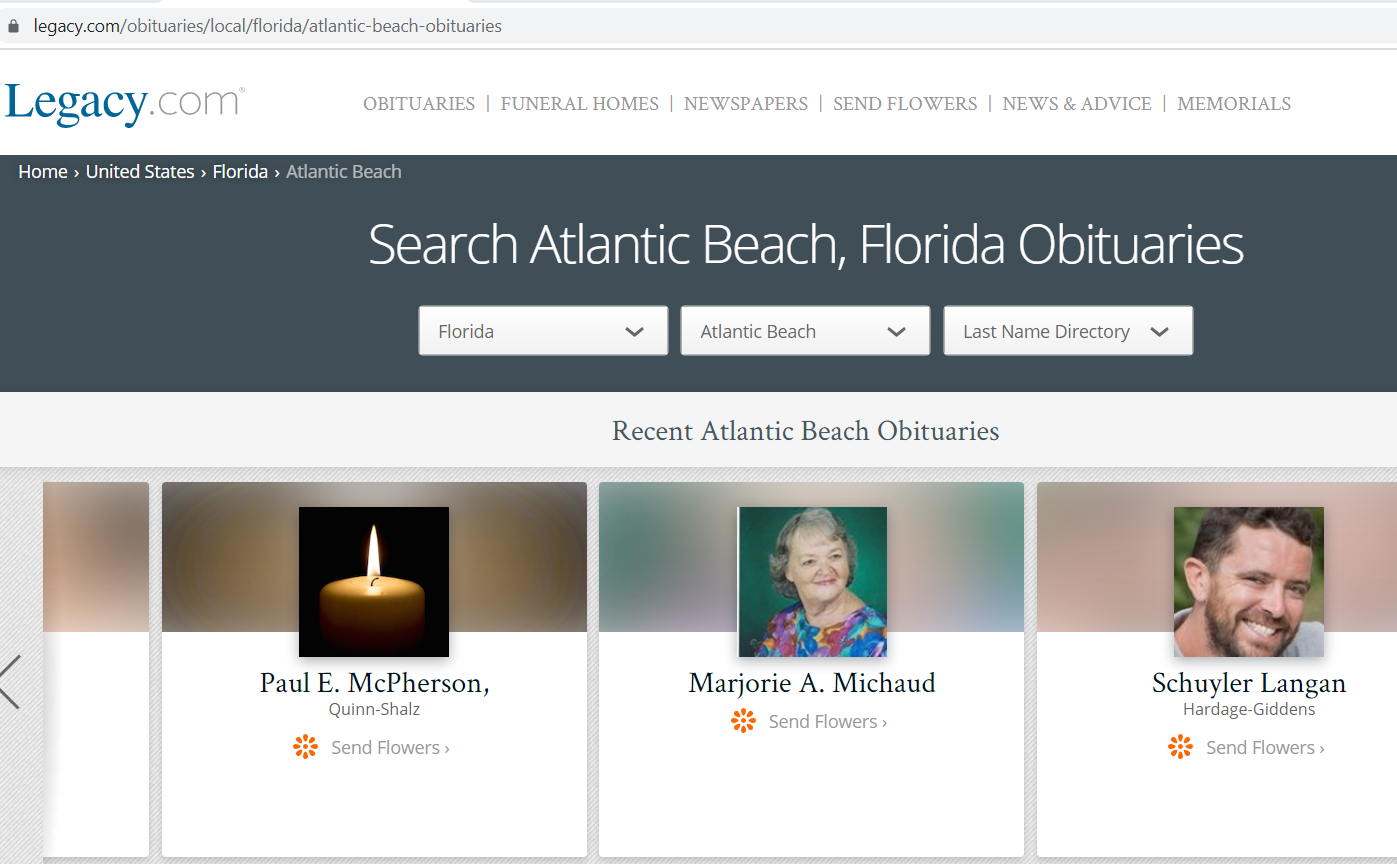
Once you find an obituary, you’ll want to do the following to qualify the lead:
The first obituary didn’t own any real estate, but the second obituary looks promising because she owned a house and her spouse already passed away.
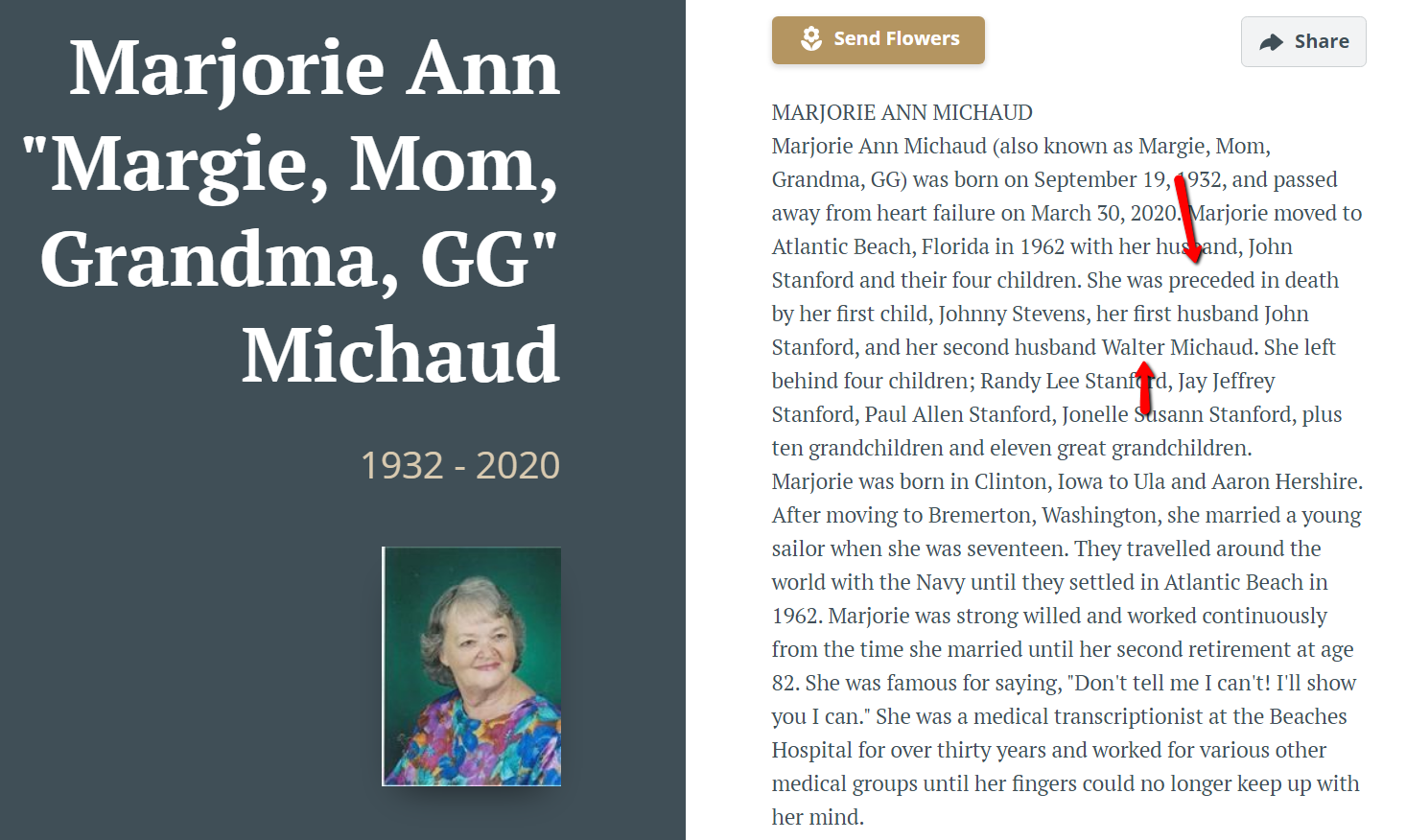
Now, search for the people’s names on the Property Records. In this case, I’m going to look up the Divorce Name from above.
I found her house on the Property Appraiser’s Website, and they already changed the owner name to include the word “Estate.”


The property is worth about $275,000, so this is definitely worth pursuing!
Sometimes, people will pass away and it will take a while for their heirs to file a Probate Case. In that situation, I recommend waiting 6 months to reach out to them.
But once 6 months has passed, I’d start reaching out to their heirs. You can usually find out who they are from the Obituary. Here’s an example:
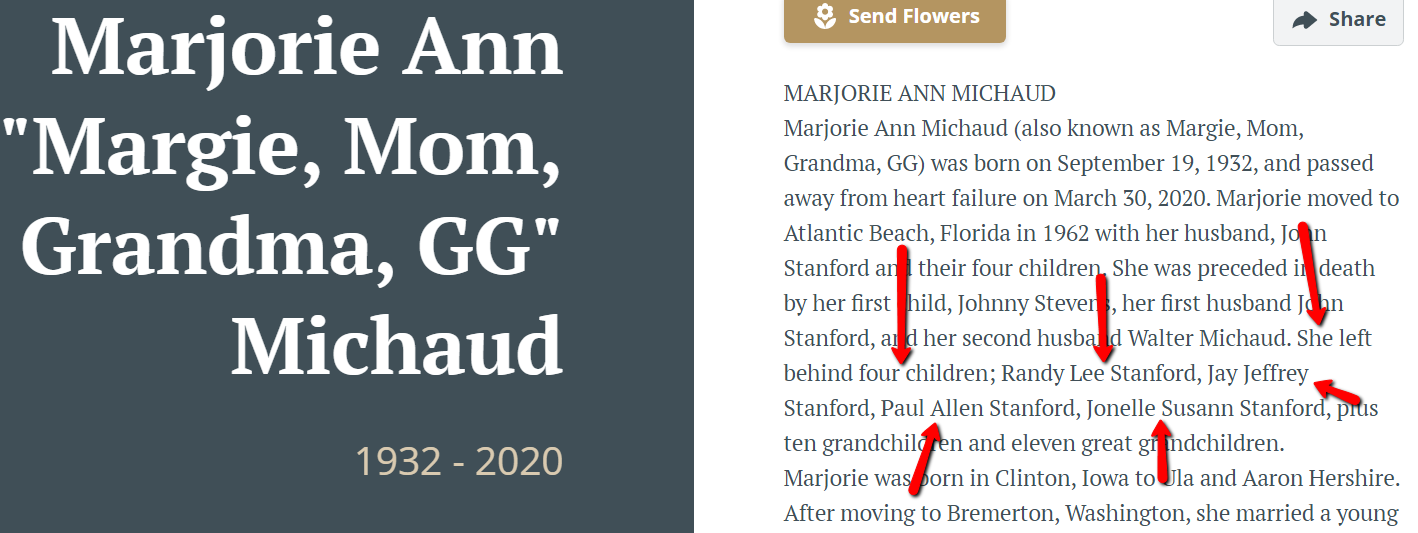
I’ve found that property records are one of the best ways to find nearby relatives. I searched to see if any of Marjorie’s children own property in the area. Turns out her son, Paul A Stanford lives about 2 miles away from her home.
I found his name and mailing address on the property records. See below.

Now that I have his name and address, I need to find his phone number. I’ll show you how to do that in Step #3 above.
Option #4. Sign up for the automated emails from Estate Sales.net.
This is the easiest way to get hot listing leads literally emailed to you. If they’re ready to do an Estate Sale, they’re probably ready to list their house. So, go to EstateSales.net and sign up for free email notifications.
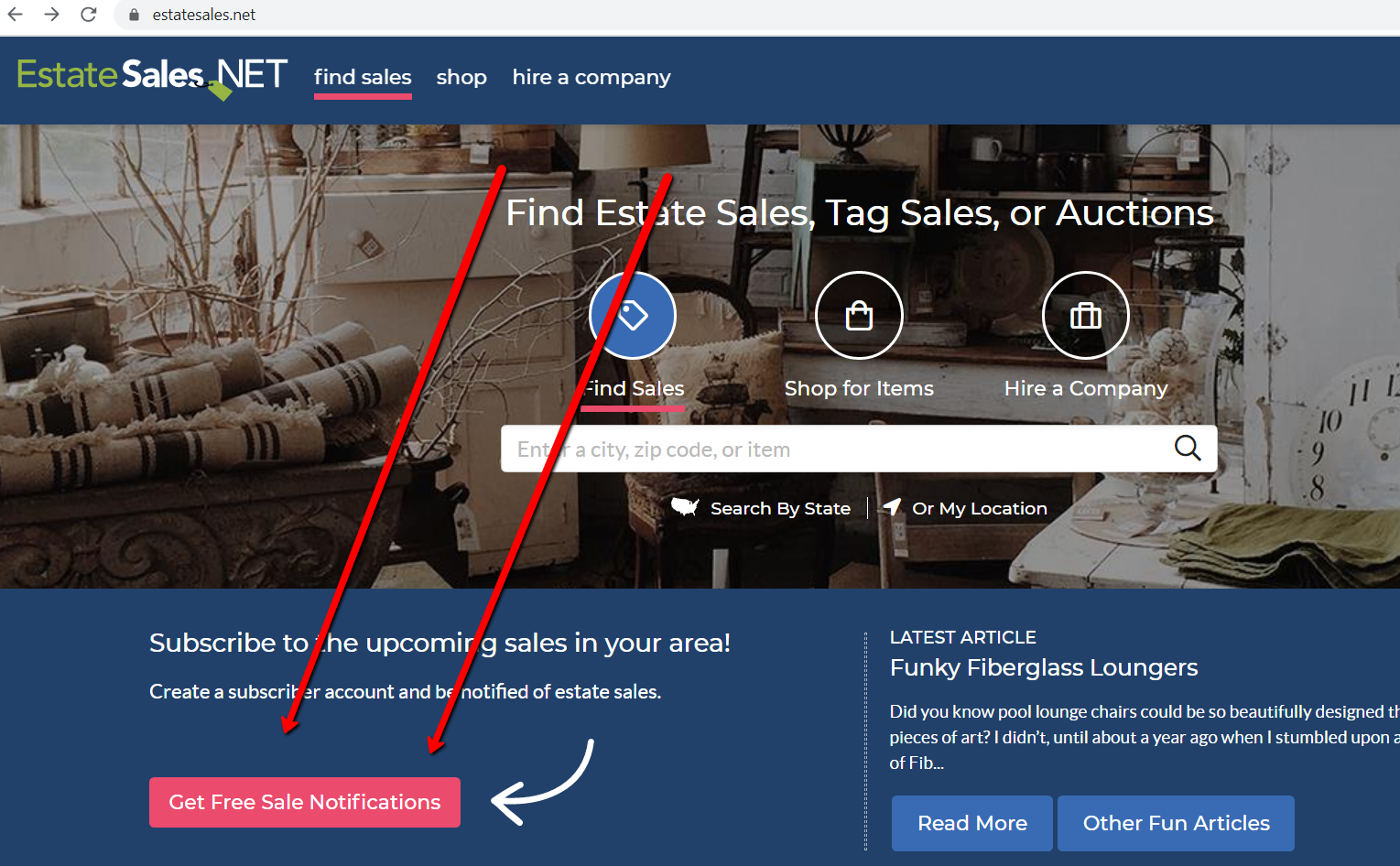
Bonus Training: How to hire an inexpensive Virtual Assistant to research the leads for you.
Tiffany is an Authorify member in Florida, and she hired someone on Fiverr to research Inherited Leads for her. She showed them how to do it, and they found over 100 Inherited Leads for her.
You can hire someone on Fiverr, Freelancer.com, Upwork, or other sites to research the leads for you.
If you would like to learn more, you can read our full Guide To Hiring A Virtual Assistant

